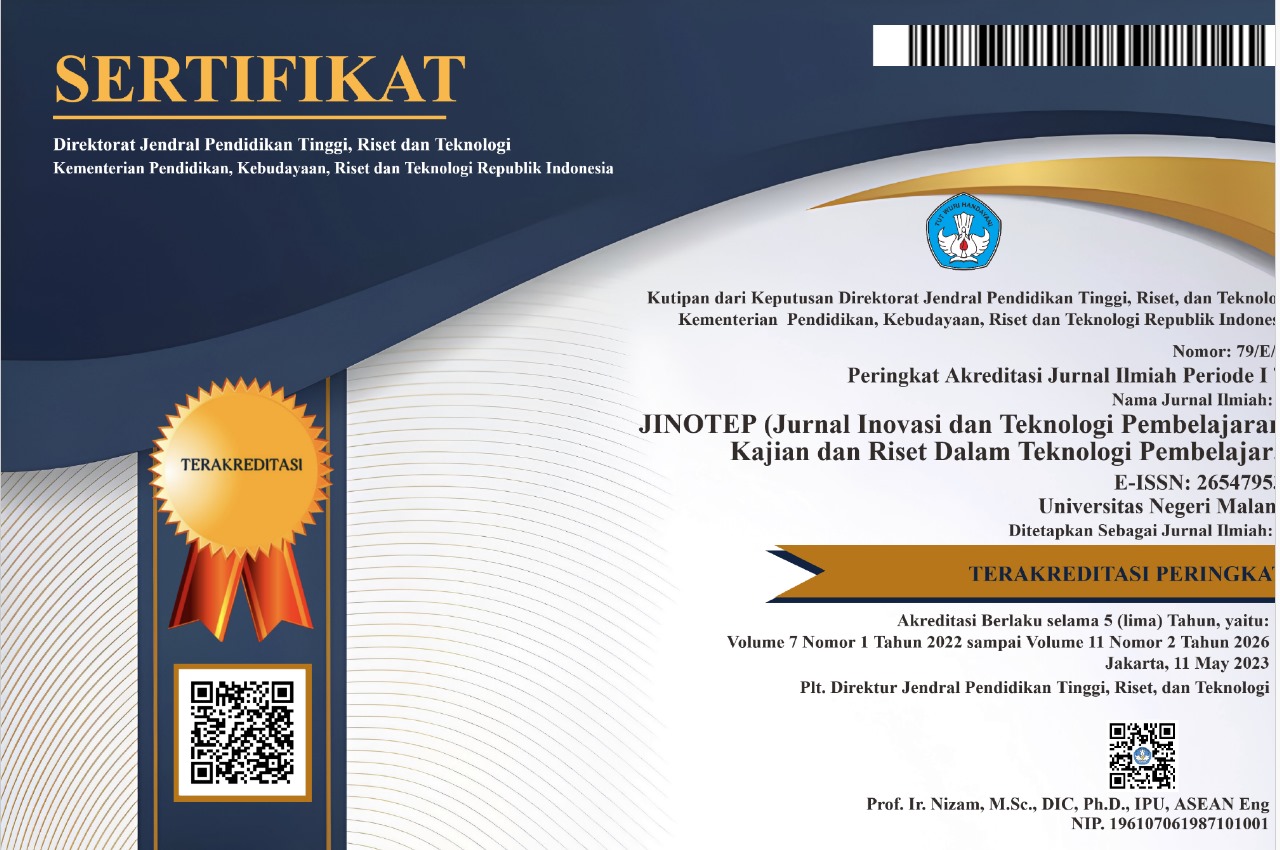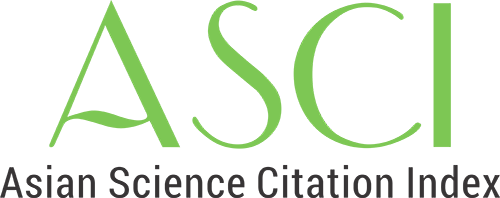Digital Literacy to Improve Pedagogical and Professional Competence of Early Childhood Teacher
Abstract
Abstrak: Pada era transisi revolusi industri 4.0 menjadi 5,0, guru memerlukan kemampuan literasi komputer dengan kemampuan untuk mencari dan mengelola data secara digital serta mengoperasikan komputer. Para guru kemudian mengikuti Pendidikan Profesi Guru (PPG) dalam jabatan yang difasilitasi aplikasi google suite untuk guru yang profesional pada era revolusi industri 5.0. Penelitian ini bertujuan untuk mengimplementasikan kemampuan digital pada guru Pendidikan Anak Usia Dini (PAUD) dalam pembelajaran PPG PAUD dan meningkatkan kemampuan pedagogi guru PAUD. Metode yang digunakan adalah mixed method dengan pengumpulan data melalui google form, hasil wawancara, studi literatur, dan relevansi data melalui penelitian yang relevan. Hasil menunjukkan kenaikan yang signifikan pada kemampuan profesional guru PPG dalam jabatan tahap 1. Guru mendapatkan pendalaman materi pedagogi dan profesional, pengembangan perangkat pembelajaran, review perangkat pembelajaran, dan tes komprehensif.
Abstract: In the transition era of the industrial revolution 4.0 to 5.0, teachers need computer literacy skills with the ability to search and manage data digitally and operate computers. On these grounds, numerous teachers take part in the teacher professional development program for in-service teachers (PPG dalam Jabatan) facilitated by the Google Suite application for professional teachers in the 5.0 industrial revolution era. This study aims to implement digital skills for early childhood education (PAUD) teachers in PPG and improve the pedagogical abilities of PAUD teachers. The method used is a mixed methods with data collection using Google Forms, interviews, literature studies, and data relevance through relevant research. The results show a significant increase in the professional ability of teachers who join stage 1 of the program. Teachers deepen the pedagogical and professional materials, development of educational materials, examination of learning material, and comprehensive tests.
Keywords
Full Text:
PDFReferences
Andrés, J., David, C.-V. J., Tatiana, V.-M., Andrea, S.-C., Solanlly, O.-A., Adriana María, C.-T., & Montes-González. (2016). ICT standards and competencies from the pedagogical dimension: A perspective from levels of ICT adoption in teachers’ education practice. In Universidad Javeriana (pp. 1–80).
Borko, H. (2004). Professional development and teacher learning: mapping the terrain. Educational Researcher, 33(8), 3–15. https://doi.org/10.3102/0013189X033008003
Borthwick, A. C., & Hansen, R. (2017). Digital literacy in teacher education: are teacher educators competent? Journal of Digital Learning in Teacher Education, 33(2), 46–48. https://doi.org/10.1080/21532974.2017.1291249
Creswell, J. W. (2015). Penelitian kualitatif & desain riset memilih diantara lima pendekatan. In Sage (Ist, Vol. 94, Issue 4). Pustaka Pelajar.
Falloon, G. (2020). From digital literacy to digital competence: the teacher digital competency (TDC) framework. Educational Technology Research and Development, 68(5), 2449–2472. https://doi.org/10.1007/s11423-020-09767-4
Friedman, T. L. (2007). The world is flat 3.0: A brief history the twenty century. Picador.
Guillén-Gámez, F. D., Mayorga-Fernández, M. aJ, Bravo-Agapito, J., & Escribano-Ortiz, D. (2021). Analysis of teachers’ pedagogical digital competence: identification of factors predicting their acquisition. Technology, Knowledge and Learning, 26(3), 481–498. https://doi.org/10.1007/s10758-019-09432-7
Hansen-Thomas, H., Casey, P. P. J., & Grosso, L. (2013). Multiplying the effect of professional development: teachers training teachers. TESOL Journal, 4(1), 129–150. https://doi.org/10.1002/tesj.54
Harmer, J. (2004). The Practice of nglish Languag Teaching (4th ed.). Pearson Longman.
Irhandayaningsih, A. (2020). Pengukuran literasi digital pada peserta pembelajaran daring di masa pandemi COVID-19. Anuva, 4(2), 231–240. https://doi.org/10.14710/anuva.4.2.231-240
Jaenudin, A., Kurnia Pitaloka, L., & Sari Melati, I. (2013). Digital literation as a teacher solution in learning the digital era and pandemic Covid-19. Economic Education Analysis Journal, 2(1), 18–23. https://doi.org/10.15294/eeaj.v10i1.44566
Lund, A., Furberg, A., Bakken, J., & Engelien, K. L. (2014). What does professional digital competence mean in teacher education? Nordic Journal of Digital Literacy, 2014(4), 281–299. https://doi.org/10.18261/issn1891-943x-2014-04-04
Nahdi, D. S., & Jatisunda, M. G. (2020). Analisis literasi digital calon guru sd dalam pembelajaran berbasis virtual classroom di masa pandemi Covid-19. Jurnal Cakrawala Pendas, 6(2), 116–123. https://doi.org/10.31949/jcp.v6i2.2133
Özden, M. (2018). Digital literacy perceptions of the students in the department of computer technologies teaching and Turkish language teaching. International Journal of Progressive Education, 14(4), 26–36. https://doi.org/10.29329/ijpe.2018.154.3
Ranieri, M., Bruni, I., & de Xivry, A.-C. O. (2017). Teachers’ professional development on digital and media literacy. findings and recommendations from a european project. Research on Education and Media, 9(2), 10–19. https://doi.org/10.1515/rem-2017-0009
Sari, W., Rifki, A. M., & Karmila, M. (2020). Pembelajaran jarak jauh pada masa darurat Covid 19. Jurnal Mappesona, 1(1), 12.
Scherer, R., & Siddiq, F. (2015). Revisiting teachers’ computer self-efficacy: A differentiated view on gender differences. Computers in Human Behavior, 53, 48–57. https://doi.org/10.1016/j.chb.2015.06.038
Solikhati, H. A., & Pratolo, B. W. (2019). The implementation of digital literacy in EFL learning: A case study in SMP Muhammadiyah 1 Temanggung. In Publikasi Uad.
Spires, H. A., Medlock Paul, C., & Kerkhoff, S. N. (2018). Digital literacy for the 21st century (pp. 12–21). https://doi.org/10.4018/978-1-5225-7659-4.ch002
Unesco. (2008). Competency standards modules. In Ict Competency Standards for Teachers (pp. 1–14). United Nations Educational, Scientific and Cultural Organization.
Utami, R. T., Roistika, N., Khoirot, U., Hanafi, M., & Herminingsih, D. I. (2019). Teacher professional development in education 4.0: awareness of digital literacy. https://doi.org/10.4108/eai.13-2-2019.2286528
Yuan, Y. H., Liu, C. H., & Kuang, S. S. (2021). Innovative interactive teaching model for cultivating digital literacy talent in decision making, sustainability, and computational thinking. Sustainability (Switzerland), 13(9), 5117. https://doi.org/10.3390/su13095117
DOI: http://dx.doi.org/10.17977/um031v9i22022p117
Refbacks
- There are currently no refbacks.
Copyright (c) 2022 Nurul Khotimah, Muhammad Reza

This work is licensed under a Creative Commons Attribution-ShareAlike 4.0 International License.
======================================================================
Jurnal Inovasi dan Teknologi Pembelajaran published by Universitas Negeri Malang in collaboration with the Asosiasi Program Studi Teknologi Pendidikan Indonesia (APS TPI) and Ikatan Profesi Teknologi Pendidikan Indonesia (IPTPI) with a MoU.
Publisher Address:
Educational Technology Laboratorium, Building D5, 1st Floor
Faculty of Education, Universitas Negeri Malang
Semarang St. No. 5, Malang City, East Java Province, Postal Code 65145
Email: jinotep.fip@um.ac.id
======================================================================

JINOTEP is licensed under a Creative Commons Attribution-ShareAlike 4.0 International License.
JINOTEP Statistics (Since July 13th, 2020)


.png)




.png)
1.png)
1.png)
4.png)
2.png)
1.png)
1.png)
.png)


_3.png)





1.png)
.png)